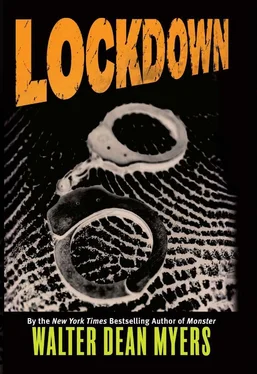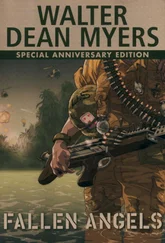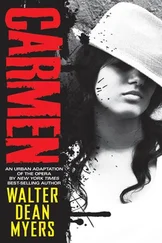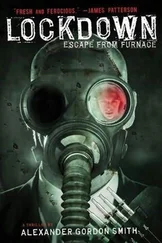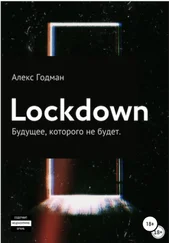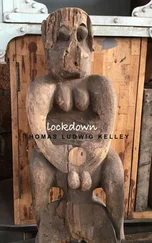Walter Myers - Lockdown
Здесь есть возможность читать онлайн «Walter Myers - Lockdown» весь текст электронной книги совершенно бесплатно (целиком полную версию без сокращений). В некоторых случаях можно слушать аудио, скачать через торрент в формате fb2 и присутствует краткое содержание. Жанр: Криминальный детектив, на английском языке. Описание произведения, (предисловие) а так же отзывы посетителей доступны на портале библиотеки ЛибКат.
- Название:Lockdown
- Автор:
- Жанр:
- Год:неизвестен
- ISBN:нет данных
- Рейтинг книги:5 / 5. Голосов: 1
-
Избранное:Добавить в избранное
- Отзывы:
-
Ваша оценка:
- 100
- 1
- 2
- 3
- 4
- 5
Lockdown: краткое содержание, описание и аннотация
Предлагаем к чтению аннотацию, описание, краткое содержание или предисловие (зависит от того, что написал сам автор книги «Lockdown»). Если вы не нашли необходимую информацию о книге — напишите в комментариях, мы постараемся отыскать её.
Lockdown — читать онлайн бесплатно полную книгу (весь текст) целиком
Ниже представлен текст книги, разбитый по страницам. Система сохранения места последней прочитанной страницы, позволяет с удобством читать онлайн бесплатно книгу «Lockdown», без необходимости каждый раз заново искать на чём Вы остановились. Поставьте закладку, и сможете в любой момент перейти на страницу, на которой закончили чтение.
Интервал:
Закладка:
"You want to hear what I was telling you that happened to me?" he asked.
"Go on," I said.
"My family lived in Java. My country owned all of those little islands before the war. My father was a schoolteacher. Very tall. We're a tall people. My mother was a seamstress at home, but when she married, she settled down to being a housewife.
"My father was offered the position of headmaster in a rural school outside of Surakarta. He planned to work there for two years as headmaster, and then return to Europe to teach. But then the war broke out. First it was the Germans and then the Japanese. Nobody thought it was going to last because nobody took the Japanese seriously. In December 1941, they attacked your country. Then in 1942, they overran Dutch Indonesia.
"We heard rumors and more rumors and I was afraid, but Mama kept telling me that everything would be all right. Then one day some Japanese soldiers showed up in our garden. There they were, sitting in our garden with their long rifles, and we were having breakfast inside. They came and took Papa away and searched the house. We had nothing in the house except books and papers. Then they left. Three days later they came again and took Mama and my sister and me to a camp. We stayed in that camp for months, and it was terrible. There wasn't enough food and we were all living one on top of the other one."
Mr. Hooft was turning in his bed and winced when he got around on his bad leg.
"You want me to call Simi again?" I asked.
He shifted onto his back and waved his hand in the air.
"But then one day they came and got all the boys and took us to a different camp. There were people crying and screaming and women fighting to hang on to their boys. You know why? You don't know why. Because there was talk of some of the men being killed. They said that the Japanese soldiers shot some of the men, and some they made them kneel on the ground and then cut their heads off."
"I don't believe that," I said.
"Why?" Mr. Hooft asked. "Why don't you believe it?"
"I never heard of it before," I said.
"Do you know about the Dutch East Indies?" he asked.
"No."
"Do you know about Martin Luther?"
"Yeah, Martin Luther King," I said. "He made that 'I Have a Dream' speech."
"No," Mr. Hooft said. "Your black Martin Luther King was named after Martin Luther-a German-who lived many years ago and who was also a religious leader. You don't know anything. That's why you're in jail."
"Fuck you."
"So when they rounded up the boys and took us to another camp, we were all terrified. The Japanese soldiers were very scary because they had dark skins-not as dark as you-and they were short. They were no bigger than we were, and we were only boys.
"But they swaggered around and they had guns. And anything you did they would punish you. Sometimes the punishment would only be a slap. Sometimes they would tie you to a fence and beat you with whips. Sometimes they would take boys away and we wouldn't see them again."
"They cut their heads off?"
"I don't think so. There were even stories that some of the youngest boys were taken to Japan," Mr. Hooft said. "But I know we never saw them again. Anyway, there was one boy in the camp I was taken to who seemed to hate everyone, but especially me. It was as if he had the soul of the devil.
"I was thin and not used to having to defend myself. When he found me-that's the way I thought it was, him finding me-it was as if he had found an answer to all of his problems. He would torment me day and night. We were given a ration of boiled barley every morning, and he would come and take mine. The other boys would see him coming and eat as quickly as possible, but I would be so petrified I would just sit and tremble."
"He punked you out," I said. "You were too scared to deal."
"I don't know exactly what you are saying," Mr. Hooft said. "What I know is that I was afraid of the Japanese. If we had a fight, I knew the Japanese would take us away and punish us. They would beat us up and maybe even kill us, and he knew it too."
"He knew that?"
"Of course he knew it," Mr. Hooft said. "He saw what the rest of us saw. But for some reason he lived on the very edge all the time."
"So what happened?"
"So after a while, maybe ten months to a year after the Japanese took over the island, and all the boys and some of the older men were in this one camp, we settled into a routine. Every morning we would have to go up the road-maybe two miles to where the men were working-and we would sit outside the gates until the guards led the men away on work details. Then we would have to go into the camp and find the dead bodies and load them onto trucks."
"The dead bodies?"
"Men died from being weak, from disease, from whatever," Mr. Hooft said. "At the time I didn't know what dying was about. But I didn't want to touch the bodies. When someone died, they tied them in cloth and put them in baskets. Then we had to lift the baskets onto the trucks. If you got the legs it wasn't too bad, because the legs weren't too heavy. The legs went up first, and then the boy carrying that end would run around and help push the basket onto the truck. But it was from the other end that the liquids came out. That was terrible, because it stunk and it would get on you and you would smell terrible all day. That's what dying meant to me, the smell. This boy, he wouldn't push the basket with the others, and then maybe the whole basket would fall on you.
"One day he and I were pushing a basket onto a truck and he moved away. I struggled as much as I could but then it fell back on me and I was on the ground and trying to catch my breath. He was a boy like me, but when he came over, he looked gigantic. His face was wide and big and he was kicking me like he had so much hate for me. His hate scared me more than the pain from his foot. I was lying on the ground. Did I fight back? I don't know. I knew it was hopeless, that we were fighting against different demons. Two guards came up and started kicking me and they knocked him down. He was bleeding and he wouldn't get up, and they kept beating him and beating him. Later that day me and another boy had to carry him in a basket for the next morning's crew."
"That really happened?" I asked.
"It happened," Mr. Hooft said. When he said it his voice changed, got very high and very soft, almost like a kid's voice. I wanted to look at his face, but he was half turned away and I could only see the thin outline of his cheek and his right eye. "It happened."
When Mr. Pugh came and got me, he asked me how I liked my vacation. I thought about telling him what Mr. Hooft had told me, but I didn't think he would have understood it.
CHAPTER 14
The stuff that Mr. Hooft said was scary. For some reason I just didn't want to deal with it, but it stayed on my mind. Maybe Mr. Hooft thought I was like that guy fighting him, or maybe even one of the soldiers. I didn't know.
On the way back to Progress I remembered Mom saying I should write to Willis. I didn't want to but I knew she would keep bugging me. Me and Willis weren't all that tight, but he was still blood and would get my back if I needed him. He would get Icy's back too. But he was steady going to thug school and making noises like he was too fast for the streets to catch up with him. One time when my pops wasn't being too stupid, he said the streets were like quicksand covered with whipped cream. You knew when they were slowing your ass down, but it always came as a surprise when you got sucked under.
In the rec room they had some paper that had PROGRESS printed on it so that it looked like a private school or something. I copped a few sheets and wrote to Willis. Dear Willis,
Mama came up to the jail with Icy. I don't know how Mama is doing but I was glad to see them. She asked me to write you a letter and say you should join the army. What she said was that being in the army would keep you off the streets and turn you away from getting into trouble. I was going to write f'd up but you can't put anything like that in a letter from here.
Читать дальшеИнтервал:
Закладка:
Похожие книги на «Lockdown»
Представляем Вашему вниманию похожие книги на «Lockdown» списком для выбора. Мы отобрали схожую по названию и смыслу литературу в надежде предоставить читателям больше вариантов отыскать новые, интересные, ещё непрочитанные произведения.
Обсуждение, отзывы о книге «Lockdown» и просто собственные мнения читателей. Оставьте ваши комментарии, напишите, что Вы думаете о произведении, его смысле или главных героях. Укажите что конкретно понравилось, а что нет, и почему Вы так считаете.
